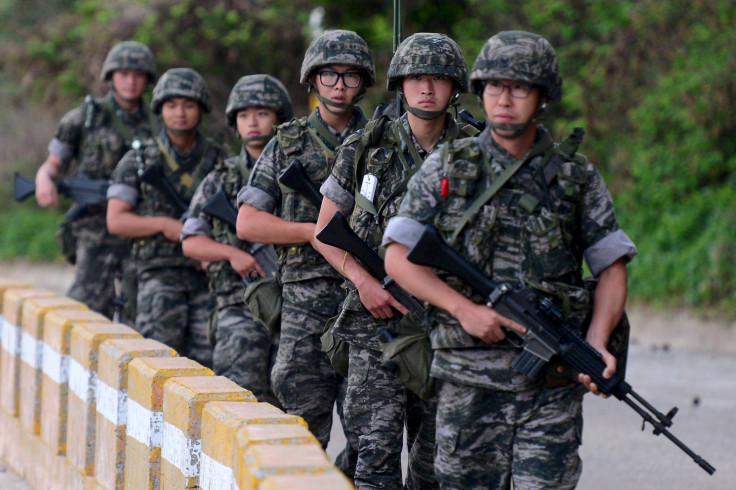As North, South Korea Hold Marathon Crisis Talks, Seoul Talks Tough

SEOUL (Reuters) - South Korean President Park Geun-hye talked tough on Monday, demanding that North Korea apologize over a recent landmine incident, even as the bitter rivals held marathon negotiations in a bid to defuse tensions that have brought the peninsula to the brink of armed conflict.
Park said anti-North propaganda broadcasts would continue unless Pyongyang took responsibility for landmine explosions early this month that wounded two South Korean soldiers in the Demilitarized Zone (DMZ) separating the two countries.
North Korea denies it laid the mines.
The incident has escalated into a crisis that saw both sides exchange artillery fire on Thursday and ramp up their military readiness. The United Nations, the United States and the North's lone major ally, China, have all called for calm.
"We need a clear apology and measures to prevent a recurrence of these provocations and tense situations," Park told a meeting with her top aides, according to a statement released by her office. "Otherwise, this government will take appropriate steps and continue loudspeaker broadcasts."
Seoul and Washington were reviewing the possibility of bringing in "strategic" U.S. military assets, South Korean Defense Ministry spokesman Kim Min-seok said, without elaborating.
During a standoff two years ago when the North threatened military action in response to joint exercises by U.S. and South Korean forces, the United States flew stealth bombers over the peninsula and sent an aircraft carrier to the area.
"Our position at this point is to deter the North's provocation," Kim told a news briefing. "But if they wage provocation, our response will be merciless and they will truly feel sorry."
North Korea had deployed twice the usual artillery strength at the border and had around 50 submarines away from base, the South's defense ministry said.
Marathon Talks
North Korea's state media has also kept up its anti-South rhetoric as the inter-Korean talks continued at the Panmunjom truce village inside the DMZ.
The negotiations began on Saturday evening, shortly after North Korea's deadline passed for Seoul to halt the anti-Pyongyang propaganda broadcasts or face military action. They broke up before dawn on Sunday and restarted that afternoon.
The delegates were "continuing talks for long hours in the midst of the critical situation" on the peninsula, Min Kyung-wook, a spokesman for South Korea's presidential Blue House, told reporters, without giving details.
Yoo Ho-yeol, a professor of North Korean studies at Korea University in Seoul, said the unusually long session was a good sign.
"They are not talking for the sake of a breakdown but for the sake of agreement. There must be a lot of fine-tuning and convincing between the two parties," Yoo said.
Park's national security adviser, Kim Kwan-jin, and Unification Minister Hong Yong-pyo are representing the South in the talks. Hwang Pyong So, the top military aide to the North's leader, Kim Jong Un, and Kim Yang Gon, a veteran North Korean official in inter-Korean affairs, are representing Pyongyang.
Ties have been virtually frozen since the 2010 sinking of a South Korean warship, which Seoul has blamed on a North Korean submarine. Pyongyang denies responsibility.
Days after the landmine incident, Seoul began its propaganda broadcasts in random three-hour bursts from 11 banks of loudspeakers, including news reports and K-pop music from the South, resuming a tactic both sides halted in 2004.
The crisis escalated on Thursday when the North fired four shells into the South, according to Seoul, which responded with a barrage of 29 artillery rounds. North Korea declared a "quasi-state of war" in front-line areas and set an ultimatum for Seoul to halt its broadcasts.
That deadline passed on Saturday without any reported incident.
The United States, which has 28,500 soldiers based in South Korea, is conducting annual joint military exercises with the South. North Korea regularly condemns the maneuvers as a preparation for war.
© Copyright Thomson Reuters 2024. All rights reserved.




















